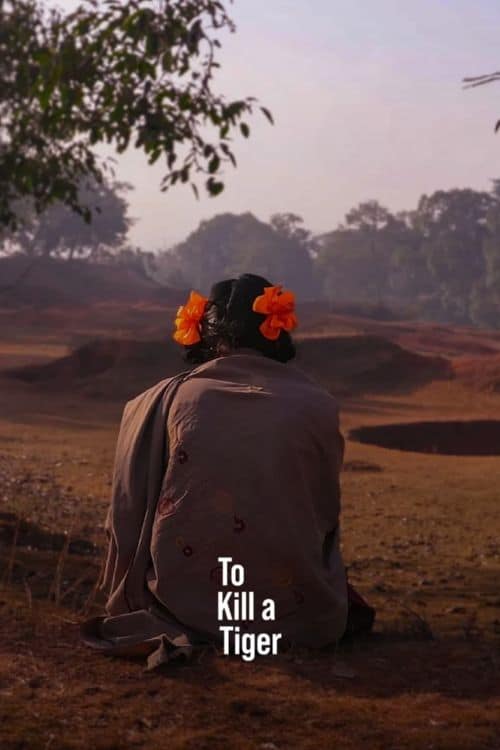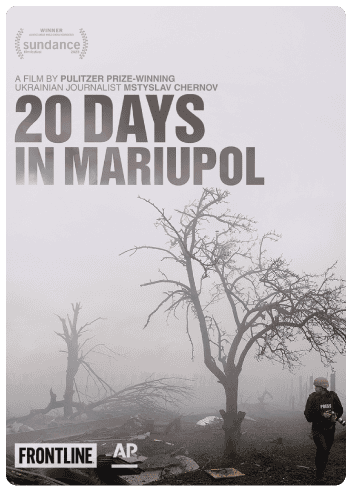20 Days in Mariupol (5*)
Bobi Wine: The People’s President (4*)
American Symphony (4*)
To Kill A Tiger (4*)
Four Daughters (3.5*)
The Eternal Memory (3.5*)
All six of this year’s Oscar documentary features are interesting, informative, and emotional – attributes making for a good documentary experience. What is especially unique about these five films is that none of them are from the U.S. so you get an international flavor on top of a normal documentary film. From the Ukraine in Europe to Tunisia and Uganda in Africa, to India and then around the globe to Chile, you can tour the world with these five films.
The weakest, but still worth a viewing, are those from Chile, The Eternal Memory, and Tunisia, Four Daughters. The Tunisian film tells a tough story of a single mother raising four daughters during the political turmoil of the Arab Spring and the subsequent fundamentalist Muslim reaction with its strong need to control women. Two of her daughters are “recruited” by extremists and end up in Libya, and, because of that, only briefly appear in the film. The problem with this movie, though, is in the filmmaker’s decision to use actors to fill their roles in an attempt to re-create family dynamics. And there is another actress who portrays the mother when the scenes are too emotionally difficult. As I wrote in my review “there is great depth to much of what they are feeling.” But one can’t quite get past the notion that the film is an extended therapy session captured on film. And I have to question the use of actors – especially one’s who attempt to advise the real mother – in a purported “documentary”.
The Chilean submission, The Eternal Memory, comes to us from the same filmmaker who gave us The Mole Agent, a 2020 Oscar nominee. I had ethical questions about that film because it seems the filmmakers didn’t give most of the subjects a true opportunity for informed consent. But director Alberdi doesn’t have that issue with this year’s entry, a heartbreaking look at a married couple where the wife is caring for her mate who no longer even recognizes her. “The camera records some very precious and painful moments in the life of a couple “ and it is the portrayal of that relationship and the destruction Alzheimer’s causes that is the reason to watch the film. Unfortunately, Alberdi had an additional idea to relate the loss of memory during Alzheimer’s to the man’s work in trying to capture the events during Augusto Pinochet’s brutal reign in Chile. She tries to make a link between personal memory loss and the dangers of losing a national memory of what happened during those times. That part of the movie just doesn’t succeed.
To Kill A Tiger, from India, is a better film following, over the course of a couple of years, a young girl’s attempts to seek justice after a brutal gang rape in a rural Indian village. With the loving support of her father, she endures huge social pressures to just marry one of the rapists in order to “remove the stain on her honor”. But her family risks severe ostracism and endures threats of violence to bring the perpetrators to justice and, in the process, illustrate how social change starts with the actions of individuals. An effective film that documents the strength of tradition and how it can adapt to a changing world.
Uganda’s entry, Bobi Wine: The People’s President, tells another story of a man seeking justice this time for an entire country as he challenges Uganda’s strongman and suffers the consequences. Bobi Wine was actually a popular African singer and, starting with songs encouraging people to challenge the system that was oppressing them, he ended up in a national election opposing the very powerful ruler of his country. Remarkably, the camera is there during several important family conversations that convey how involved and committed Bobi was to both his country and his family, Interestingly, the same week I was working on this film, he was again shot in the leg with a tear gas container. His story does not end.
American Symphony is a late addition to this review and, unlike the other five, was not a nominee for Best Documentary. Instead they snuck this one in as a nominee for Original Song and, somehow, I missed it when I originally wrote this genre review. It is a remarkably intimate view of a more than a year in the life of musician Jon Batiste. It covers a difficult time in his wife when he is winning multiple Grammy awards, composing a cross-cultural symphony to be performed in Carnegie Hall, and dealing with his wife’s re-occurrence of cancer. Told with objective and intimate precision by cameras that even follow him into his bedroom and his therapy sessions, he comes across as a loving, resilient, and dynamic person that we should probably continue to follow.
And the winner of this year’s Documentary Feature Oscar was 20 Days in Mariupol, the blistering indictment of the Russian invasion of that Ukrainian city. The film shows journalism at its best and convincingly documents the Russian assault on civilians and even hospitals, obviously war crimes. This movie will make you angry if nothing else does. I agree that this is the best of this year’s documentary movies and, if you haven’t seen it, you owe it to yourself to watch the film in order to understand the trauma that is the Ukrainian’s daily life.
All five of these films are worth a viewing. Although the quality differs a bit, they all provoke emotional response as we see people around the world dealing with nearly intractable situations – war, powerful officials, subversive politics, the constraints of traditions and beliefs and Alzheimer’s disease. We see the effects of these problems, but we also see great examples of human resilience and decisions to not accept these problems as insurmountable. We also see the beauty of different landscapes and the people that inhabit them. There is plenty to keep you busy with these five movies!
But if they aren’t enough, three of last year’s nominees are highly recommended. A House Made of Splinters (4.5*) is a heart wrenching chronology of Ukrainian children who have parents that just aren’t capable of taking care of them. Given the situation there, this is really a double whammy for the children and I was amazed at the degree of trust the filmmakers were able to make with their subjects. All That Breathes (4*) documents three Indian Muslims who, despite their own issues, take on the responsibility of providing animal rescue service to meat-eating Black Kite birds. It is an interesting melding of documentary and art film. And, of course, Navalny (3.5*) unfolds like a political thriller but given that Vladimir Putin is the real villain – and the fact that Navalny died earlier this year in prison – makes this an important essay on real and current events.
If documentaries are your thing, here are eight of them you should see.


